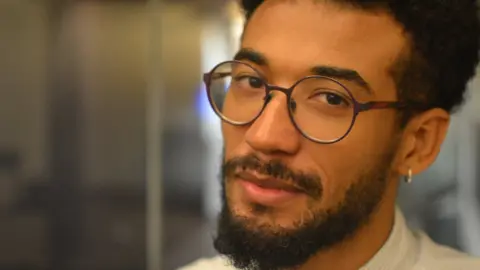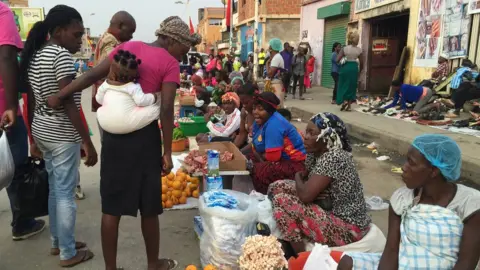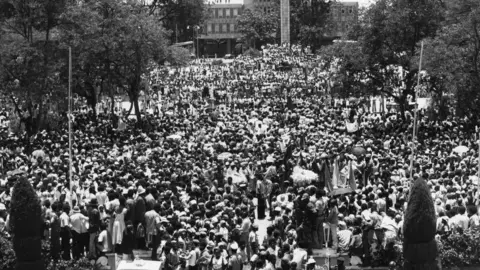Why Angolan singer Toty Sa'Med writes songs in Kimbundu
 BBC
BBCMusician Toty Sa'Med can't say more than a few words in the Angolan language of Kimbundu but he insists on writing his songs in the language. He explains why.
My great-grandmother was the last person I knew personally who spoke only Kimbundu.
She died 15 years ago.
It's a local language in Angola, spoken in the area surrounding the capital Luanda. That's where I was born and brought up but, even so, I can only speak a few words.
I hear street hawkers in Luanda speaking Kimbundu among themselves. They come from the countryside and they are very connected to their culture.
So when I buy something off a street hawker, sometimes I greet them in Kimbundu. Almost everyone can at least say hello. I even greet some of my friends in Kimbundu.
But when I ask to buy something, I have to switch into Portuguese because I don't know how to say much more in Kimbundu.
The seller responds in Portuguese because almost everyone who speaks Kimbundu knows how to speak Portuguese too.

I don't know anyone who solely speaks Kimbundu.
We still hear the language every day because we mix some of the words in with our Portuguese. Friend, for example is Kamba.
But we don't know how to construct sentences because we haven't had the chance to learn it properly.
Prejudice
When I was a teenager my headmaster decided to put Kimbundu in our timetable at school. This was unusual - it wasn't on the curriculum in Luanda but I went to a private school.
As a 13-year-old I didn't realise that it was important - it was the lesson we used to chat through and disrupt.

Some Kimbundu phrases
- Hello, how are you? - Wazekele kyebi?
- I am fine - Ngazekele kyambote
- What is your name? - Dyjina dye?
- My name is Toty Sa'Med - Eme Toty Sa'Med
- Please - Nga ku diondo
- Thank you - Ngasakidila
- Goodbye - Nde kiambote

I had some prejudices about Kimbundu. We were taught by society that the language wasn't beautiful or civilised.
We dismissed it because we thought it was a language for savages.
When the Portuguese colonised Angola, they tried to diminish the value of Kimbundu and other local languages. Suppressing the culture made it easier to colonise us.
They took away our local names and now almost everyone in Angola has Portuguese surnames.
That caused us as teenagers, all those generations later, to despise the language and to find it embarrassing to speak in Kimbundu.
Then things changed for me.
I started travelling around the world to perform.
When I saw other successful African artists, I started to value my culture more.

Discover Angolan music
Hear more from Toty Sa'Med and six other Angolan artists on Global Beats in Luanda.
Broadcast times on the BBC World Service:
- 14:06GMT on Saturday 17 March 2018
- 20:06GMT on Sunday 19 March

I realised that I have all these foreign influences but I don't bring anything new to the scene. I played like other people and I sang like other people.
I started to gain consciousness about my own culture and started to value it.
I decided it was time to use my art to influence people of my generation and encourage them to learn our languages.
I covered a song by a singer called Artur Nunes from the 1970s which we heard playing on the radio when we were growing up.
I already knew all the words but I didn't know what they meant.
Purge
The song was called Kizua Kingui Fuá which means The Day I Died. It talks about how he wants people to act when he dies. He doesn't want any sadness, just joy.
At that time he would have had to speak to the elders in Kimbundu - in the 1960s his mother probably would not have known Portuguese.
Singers back then, when they sang about politics or social matters, they sang in Kimbundu.
 Getty Images
Getty ImagesBut in 1977 there was a purge and most of those Kimbundu singers were killed or imprisoned and they lost their careers and their reputations were ruined.
Nunes was one of them.
I think that purge had a detrimental effect on how much Kimbundu was spoken.
But it wasn't the only thing that has led to fewer people speaking the language.
Joss Stone sings Kimbundu
When Angola gained independence in 1975 it was followed by a long war which led to a massive exodus from the countryside to the big cities.
We have over 25 local languages in Angola so when people moved to the capital Luanda they used Portuguese as the language to communicate.
On top of this, the people in power after independence didn't care about Angolan languages. This affected our culture deeply.

Which language in Angola?
- The Portuguese arrived in Angola in 1483 and left in 1975
- Portuguese remained Angola's official language after independence
- Angola has around 42 local languages
- The most widely spoken are Fiote, Kikongu, Kimbundu, Kwanyama, Mbunda, Nganguela, Nyaneka, Tchokwe and Umbundu.

So now I think it is important we make an effort now to learn the language.
I decided that I can do my bit to keep the language alive by writing songs in the language.
The problem is that I can't construct a sentence.
So I asked my friend to help. I wrote the lyrics in Portuguese and she translated them.
Her mother was born and raised in the Kimbundu-speaking area Kwanza-Sul. She heard her mother and grandmother speaking Kimbundu when she was growing up so she is already is familiar with it.
Even so, she didn't speak it much and had to take lessons.
The title of my first song in Kimbundu is Zakukina Neme, which means Come Dance With Me.
I sing about dancing all the way from the house to the city centre.
The British soul singer Joss Stone got in touch and asked to do a duet with me as part of her Total World Tour. Her aim is to play a concert in as many countries in the world as possible.
Allow Google YouTube content?
She has a brilliant ear.
She listened to my song and wrote down the words as she heard them and memorised them without knowing what they meant.
The next stage for me is to learn how to construct sentences for myself so I've enrolled at Kimbundu school.
I've already persuaded my girlfriend to go to the classes with me and I want some of my friends to register as well so we can speak the language together.
If we start now, maybe 60 years from now we will speak Kimbundu, with a few words of Portuguese, rather than the other way round.
Global Beats Angola is broadcast on BBC World Service at 14:06GMT on Saturday 17 March 2018 and 20:06GMT on Sunday 19 March 2018.
